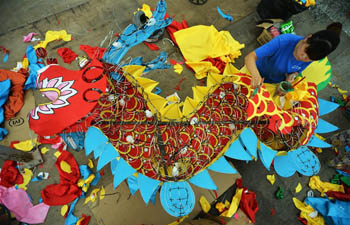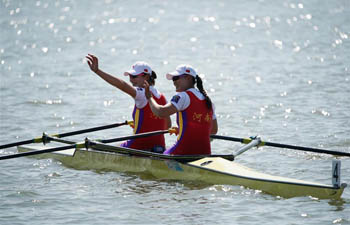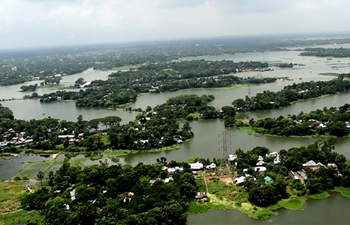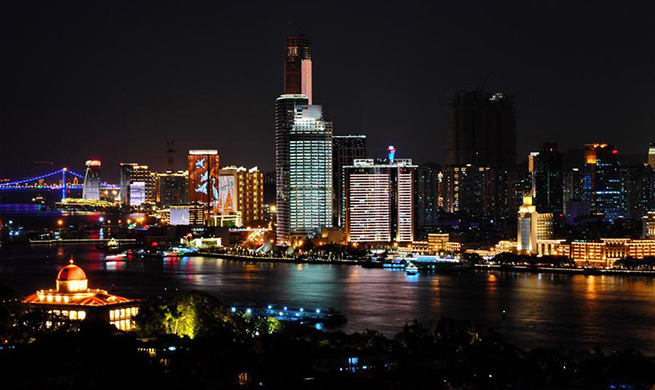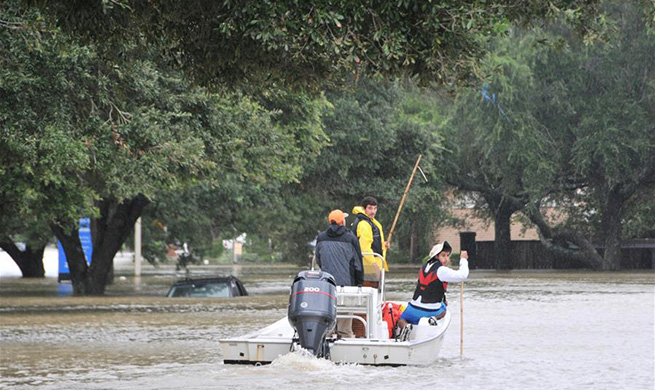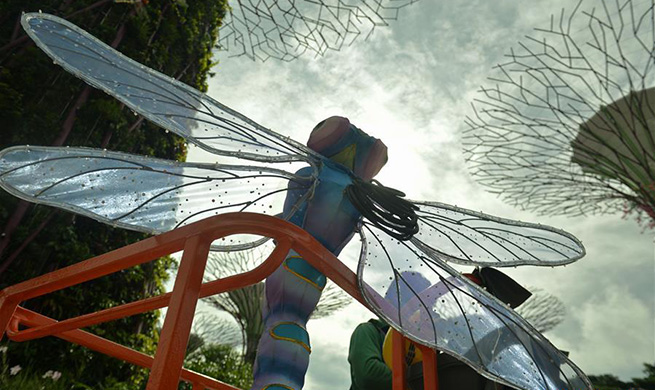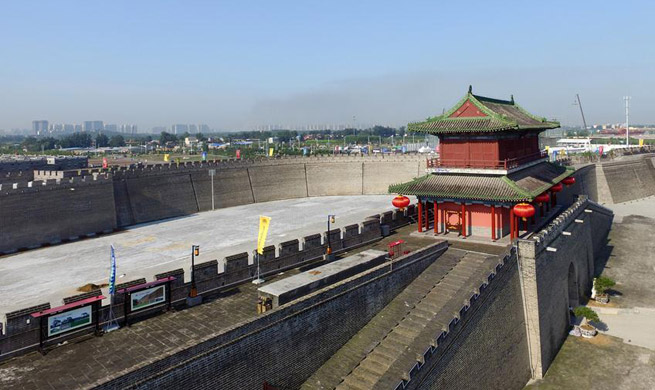DHAKA, Aug. 30 (Xinhua) -- Boats are now the only lifeline for hundreds of people living on a remote island on Jamuna, one of the three major rivers in Bangladesh.
Beribari Island in Bangladesh's northern Sirajganj district, some 134 km northwest of Dhaka, has been left completely cut off from the mainland for a month by flesh floods that have battered the entire region recently.
The islanders have said that the powerful floods have washed away almost everything.
Scores of flood-displaced families were forced to move to higher grounds on the island this week as they await relief supplies from both the government and the non-governmental organizations.
The Bangladesh Red Crescent Society with support from the International Federation of Red Cross and Red Crescent Societies, among other organizations, has been continuing its efforts to support the vulnerable people there.
Heavy flooding has left millions of people displaced in some 20 districts in the northern part of the country, with Beribari Island one of the worst affected areas in the region.
Rising water levels have almost submerged the entire island and many residents have fled the devastation.
Flash floods overnight washed everything away, said Nasima, a woman in her 50s, while queuing up for emergency supplies.
"I have received relief materials from the Bangladesh Red Crescent Society and they've been a lifesaver. I received 15 kg of rice, some lentil, sugar and other essentials," she said, adding how grateful she was.
Forty-year old Foara has also been displaced by the flood.
"Thankfully the Red Crescent Society has been providing us with purified water. This water is vital as its free of germs," she said.
Red Crescent Society volunteer Sujon Kumar Roy said they are distributing relief materials to 130 families in need.
"We select the worst-affected flood victims and provide them with relief support," the volunteer told Xinhua.
Another volunteer Fatima Parvin Nancy said they have also been supporting the most vulnerable people in society who have been hard-hit by the floods, with children, disabled people and pregnant women being given priority access to relief supplies.
Australian Tom Bamforth, a shelter cluster coordinator with the International Federation of Red Cross and Red Crescent Societies (IFRC), who has been making immense contributions to the Bangladesh Red Crescent Society's efforts to support the flood victims, said it continues to be a very difficult situation here.
"The floods are devastating and the water's still rising. People we've talked to said they've had to walk through water up to their necks to get from one place to another," Bamforth said.
He said it will likely take a long time for the waters to go down.
"While everybody is struggling under the effects of the floods, the Red Crescent Society is doing a fantastic job in delivering food, purified water and providing other assistance," he said.
Matthew Marek, an American national, who also works for the IFRC said "I just visited one of the chars (islands).
He said volunteers there are distributing dry food rations to 130 households.
"The volunteers have to take all of the emergency supplies by boat and identify the most vulnerable on the islands. The work they do distributing supplies is as wonderful as it is humbling," he said.
Corinne Ambler, communications aid worker with the IFRC in Dhaka for the most recent flood operation, said they are working closely with the Bangladesh Red Crescent Society to get aid as quickly as possible to those who most need it.
She said the IFRC has already launched an emergency appeal to help around 100,000 people affected by the monsoon-triggered floods in Bangladesh.
"The Bangladesh Red Crescent Society has conducted emergency operations in 20 districts affected by flooding. Now we have moved into the relief phase and are working in the five worst-hit districts," Ambler said, adding the IFRC has launched an appeal for 4.7 million Swiss francs (about 5 million U.S. dollars) to assist the worst-affected people in Bangladesh.
"So far we have raised 85,000 Swiss francs (about 90,000 U.S. dollars) and another 940,000 Swiss francs (about 996,000 U.S. dollars) has been pledged," she said.
The government has said in total around 8.6 million people have been affected by the seasonal floods caused by heavy monsoon rains.
Close to 750,000 homes have been damaged or destroyed, and high river levels have also resulted in widespread river erosion, forcing many communities to relocate.
Government figures estimate that almost 17,000 houses have been completely washed away.
The floods have impacted 19 districts across the country, with the northern districts of Jamalpur, Shirajganj, Tangail, Kurigram and Gaibanda still reeling having been the first to be hit by flooding at the end of July.
"The floods have inflicted significant damage and hardship across the country. Homes have been completely destroyed, there's a shortage of clean water and a lack of toilets. People's livelihoods have been left in tatters," said Mozharul Huq, secretary general of the Bangladesh Red Crescent Society.
Communities in Bangladesh have become accustomed to dealing with floods, but this year's monsoon season has been particularly bad.
"Receding floodwaters do not mean the end of the problem -- quite the opposite," said Huq. "This is when people really need help to rebuild their homes and lives. They also need support to ensure they are better prepared for such recurring natural disasters."
There has been an increase in the frequency and intensity of natural disasters in Bangladesh and this season's monsoon floods followed closely behind Cyclone Roanu, which struck the country in May, affecting around 1.3 million people.
"The emergency appeal will provide vital assistance to thousands of people affected by the floods," said Azmat Ulla, head of the IFRC's delegation in Bangladesh. "However, my big concern is that the frequency of these natural disasters in Bangladesh has led to donor fatigue. We are committed to providing effective humanitarian aid at a local level, but we can only do so with the necessary international financial support."
To date, Bangladesh Red Crescent volunteers have distributed food to more than 36,000 people. The Red Crescent Society is using nine water treatment kits, each of which can treat water at a rate of 1,000 liters per hour, to provide clean drinking water to 15,000 people across the districts of Bogra, Sirajganj, Jamalpur and Kurigram.




